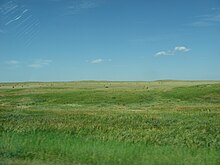The Revenant (2015 film)
Years later, in late 1823, during the Arikara War, Glass guides Captain Andrew Henry's trappers through the territory of the present-day Dakotas.
While he and his half-Pawnee son, Hawk, are hunting, the company's camp is attacked by an Arikara war party which is seeking to recover its chief's abducted daughter, Powaqa.
When the only volunteers are Hawk and the young Jim Bridger, Fitzgerald, wanting the money to recoup his losses from the abandoned pelts, also agrees to stay.
The next morning, Fitzgerald convinces Bridger, who is unaware of Hawk's murder, that the Arikara are approaching and they must abandon Glass.
Glass props up Henry's corpse on his horse to act as a decoy, taking its place himself to ambush Fitzgerald and shoot him in the shoulder.
Development of The Revenant began in August 2001, with producer Akiva Goldsman acquiring the rights to Michael Punke's then-unpublished manuscript.
[16] In November, New Regency Productions joined to produce with Anonymous Content, and 20th Century Fox was confirmed to be distributing the film.
"[20] The project was put on hold in March 2012, as New Regency hired Iñárritu to direct an adaptation of Flim-Flam Man, Jennifer Vogel's non-fiction book about her criminal father.
[22] In December 2012, Iñárritu announced that his next film would be Birdman or (The Unexpected Virtue of Ignorance), a comedy-drama about an actor who once played a famous superhero.
[17] Worldview Entertainment, which also co-financed Birdman, was originally set to fund the film but backed out in July 2014 due to the departure of CEO Christopher Woodrow.
[27] A planned two-week break from filming in December was extended to six weeks which forced Tom Hardy to drop out of Suicide Squad.
In February 2015, Iñárritu, who shot the film using natural lighting, stated that production would last "until the end of April or May", as the crew is "shooting in such remote far-away locations that, by the time we arrive and have to return, we have already spent 40% of the day".
Though the initial plan was to film the last scenes in Canada, the weather was ultimately too warm, leading the filmmakers to locations near the Río Olivia in Tierra del Fuego, Argentina with snow on the ground, to shoot the ending.
[27] Iñárritu stated that some of the crew members had left the production, explaining that "as a director, if I identify a violin that is out of tune, I have to take that from the orchestra."
[39][40] Additional licensed music includes "Become Ocean", the Pulitzer Prize and Grammy Award-winning work of John Luther Adams as recorded by the Seattle Symphony with conductor Ludovic Morlot and an excerpt of "Jetsun Mila" from French musician and composer Eliane Radigue.
[45][46] In the Los Angeles Review of Books, critic Wai Chee Dimock compared The Revenant's themes with those addressed in the literary works of James Fenimore Cooper, particularly The Last of the Mohicans.
Dimock argues that the film reinterprets the concept of "half-breeds" from a derogatory idea that Cooper despised to an aesthetic way in which to see the world.
Dupuis was originally offered a role as a voyageur, but he rejected it due to perceptions of anti-French bias and historical inaccuracies.
[49][50][51][52] According to Allan Greer, the Canada Research Chair of colonial North America, "generally the American traders had a worse reputation than the Canadians.
I debated with myself, if I should bring up this uncomfortable subject tonight but in light of the constant and relentless xenophobic comments that have been expressed recently against my Mexican fellows, it is inevitable.
[71] In October 2016, a former 20th Century Fox employee was fined $1.12 million in a separate case for uploading both The Revenant and The Peanuts Movie online.
[73] In North America, The Revenant opened in limited release on December 25, 2015, and over the weekend grossed $474,560 from four theaters in New York City and Los Angeles ($118,640 per screen), finishing twenty-third at the box office.
[75] The film earned a total of $1.6 million from its two-week limited run before expanding wide on January 8, 2016, across 3,371 theaters.
[87] It made $20.5 million from 2,407 screens in just 18 markets, placing behind The Force Awakens at the international box office chart and first among newly released films.
[88][95] It had one of the top ten openings of all time for a Fox film, not accounting for inflation in South Korea with $5.7 million and went on to top the box office there for a second weekend with $3.22 million despite cold weather affecting theater attendance resulting in low box office performance.
The website's critical consensus reads: "As starkly beautiful as it is harshly uncompromising, The Revenant uses Leonardo DiCaprio's committed performance as fuel for an absorbing drama that offers punishing challenges—and rich rewards.
[9] Peter Travers of Rolling Stone called DiCaprio's acting "a virtuoso performance, thrilling in its brute force and silent eloquence".
[citation needed] Justin Chang of Variety wrote Iñárritu "increasingly succumbs to the air of grim overdetermination that has marred much of [his] past work" and it was "an imposing vision... but also an inflated and emotionally stunted one".
"[8] Richard Brody of The New Yorker was critical of the film, and said that Emmanuel Lubezki's images were mere "pictorial ornament[s] to Alejandro G. Iñárritu's bland theatrical stagings".
[113][114][115] The Revenant has received numerous award nominations and wins, particularly for DiCaprio's performance, Iñárritu's direction and Lubezki's cinematography.


